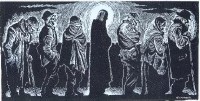

Karen House Catholic Worker
 |
Karen House Catholic Worker |
The RoundTable
Jobs and Justice Spring 1995
Major Articles
|
Download Entire Issue by Clicking Image Above |
|||
Karen House: 1840 Hogan St. Saint Louis, MO 63106 Contact Us: 314.621.4052 |
Regular Features
|
Why This Issue: Is there work available? Does it provide a living? Is the work meaningful? Does the work bring forth something to enhance the lives of others? On the other hand, what items are we able to buy? Where do they come from? What was used in producing them? How were the workers treated and paid who produced them? How does the work we do or the things we consume affect the earth and our future? There are probably few of us who are happy with every answer we give to these questions and probably few of us feel much control over the economic forces that determine the choices we do have. With the growth of the global market, the average person has less say about these critical matters. This Round Table addresses this issue by looking at ways that we can regain control over our economic lives. By creating alternative enterprises based on cooperative models and by finding ways to create economic opportunity for low-income people we can engage in economic activity which both empowers people and enhances life rather than just maximizes profit. Virginia Druhe does an excellent job of describing community-based economics in contrast to the free market capitalism of the global economy. She also lays out suggestions about what is needed to make it work. Wendell Berry makes the point that the politics of food, like any other politics, involves our freedom. We can make choices about what we eat, rather than being passive. Monica Hingorani looks at Mahatma Gandhi's vision of economic development and suggests that a Gandhi-inspired program in India might have applications to women on welfare in the United States. Glen Larson describes the RO.M.E. Community programs in rural Maine which offer shelter, health-care, education, work, and participation in a land trust. Kim Jayne tells the story of the St. Louis Women's Support Group and their efforts toward individual and community development. The centerfold lists some alternative enterprises, ranging from cooperative ventures to those which offer opportunity to low-income people. In our regular feature articles, Bob Corbett reminds us that although Haiti is less often in the news, the suffering and injustice endured by the Haitian people bas not greatly lessened; Mary Ann McGivern gives us a review of Mev Puleo's book, The Struggle is One: Voices and Visions of Liberation; Annjie Schiefelbein describes the sharing of stories done around Karen House; and Mark Scheu addresses the vindictiveness that is so pervasive in these times. Elmira Taliaferro offers a poem about Karen House. We hope this sampling of articles focusing on community-based economic alternatives will encourage all of us to continue on the path toward economic justice. - Teka Childress |
The RoundTable is 24 pages long. To download, you'll need the most recent version of Adobe Acrobat. Download Adobe Acrobat 8 here (it's easy AND free!)
Search all of the RoundTable issues for an author, subject or title here: |